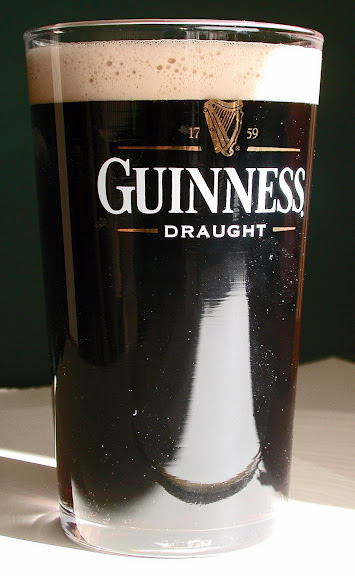 Its a lovely hot and sunny day here in North Lincolnshire so what better image for our theological reflection than this exquisite pint of cold Guinness in a straight glass. At the top of the glass is the classic creamy, frothy head, made by slow pouring and lots of patient anticipation. The Guinness swirls and bubbles until slowly the head emerges and settles from the beer so that below the froth lies the body of the drink: black and dark and cold. At a rough guess there is something like an 9:1 ratio by volume of dark beer to froth. How does this image play in your imagination?
Its a lovely hot and sunny day here in North Lincolnshire so what better image for our theological reflection than this exquisite pint of cold Guinness in a straight glass. At the top of the glass is the classic creamy, frothy head, made by slow pouring and lots of patient anticipation. The Guinness swirls and bubbles until slowly the head emerges and settles from the beer so that below the froth lies the body of the drink: black and dark and cold. At a rough guess there is something like an 9:1 ratio by volume of dark beer to froth. How does this image play in your imagination?
I originally used it at Harvest Festivals. I was especially concerned to avoid worship being all about the froth, the light and bubbly things on the surface of our common life. I wanted to plunge below the froth to the dark, cold and bitter experiences which were surely there beneath the superficial jollity. There was no getting away from that 9:1 ratio, which is one reason why I struggle when worship consists largely of praise songs only. I yearn for the integrity which reflects honestly and lovingly upon what lies beneath the froth. I guess this is why I am so drawn to the Iona Community's approach and the material produced by the Wild Goose Resource Group. For me they get the ratio just right.
At Harvest Festivals my particular bete noir is the hymn 'We plough the fields and scatter', which I happily admit to loathing. I'm sorry if its one of your favourites, but I'm just being honest. God feeds and waters, God sends all manner of meteorological phenomena and, most of all, God sends us all the good gifts around us. The message is - God is responsible. Snow, warmth, sunshine, rain, food, life, health: all these good gifts are sent in and by 'his' love. As an ecologist I find its theology infantile and as a pastoral practitioner I baulk at the lopsided notion that God sends all the good things around us without this hymn once giving thought to the 'bad' things.
Below the froth there is a verse to 'We plough the fields' that the world has every right to sing, and which I wrote in my anger and frustration as a student minister confronted by a 4 year old girl dying from cancer: I am distressed and anguished at the pain I see, the cancer and the cruelty seems so unjust to me; has your God fallen silent, why is our world so bad, how can you sing such nonsense when I am left so sad? All bad things around us are they from heaven above? O tell me please, yes tell me please, how can you talk of love? For the good gift of rain we see drought, for health we see illness, for food we see starvation, for life we see death.
In so much of the new missional writing there is a profound realisation that our calling as disciples will only come alive and have meaning when we plunge into the dark, cold and bitter places in the communities of which we are a part and find God's love there. Or if the truth be told should that more often than not read in which we are apart? That 9:1 ratio points us to where Jesus waits beyond our froth. It points to those hurting people way beyond 'church' to whom he calls us.
There is a beautiful and powerful grassroots Kingdom movement arising all over the globe ... people are waking up to the truth that the Kingdom of God looks like Jesus and that the heart of Christianity is simply imitating him. (Submergent)
...a growing network of people who want to put the ethical teachings of Jesus into practice (living simply, caring for the poor, practicing hospitality, making peace, etc.) Jesus calls us to a revolutionary way of life. He challenges the economic, political, social, and religious status quo. And we want to follow in his footsteps. (Christarchy)
Please read Kathy Escobar's quite brilliant post about being missional and ponder what she says. Dan from Vancouver, who blogs as poserorprophet, has really got right into the heart of this: This, then, is the question I would like to ask, as I attempt to start a meme: when confronted with 'the Poor' of our day, how do you justify your own academic endeavours? In his post Why I am Drawn to the Places and People with Whom I Journey Dan explores this further:
by far, the single greatest thing that draws me to these places and people, the thing that draws me inexorably, is the presence of our crucified Lord, who resides therein. To my own amazement I have discovered that such places, and such people, are often overflowing with the presence of God. What else can explain the existence of vibrant communities within neighbourhoods that stand condemned? What else can explain the existence of radical acts of sacrifice, sharing, love, and solidarity, amongst those who are used, despised, and forsaken by the vast majority of us? What else can explain the joy that bursts forth with such freedom from those who, by all of our standards, should be completely miserable? It is all of these things, all of these sacraments of God's presence with, and within, 'the least of these' that draws me most forcefully to places and people of exile
In his comment on Ben Myer's post, The pornographer's dream: or, the problem with contemporary worship, he goes on to say that
I suggest we heed the words of Porfirio Miranda: The question is not whether or not someone looks for God, but whether he [or she] looks for God where God himself said he was. Thus, the intimacy we seek with God, is to be found in the company of the poor.
In her prize-winning take on what it means to be empowered by the Holy Spirit Julie Clawson finds herself equally drawn to life beneath the froth:
We should be the ones loving boldly, sharing the good news, and taking care of the needs of the hurting. We should be the ones out there bringing families back together, healing broken marriages, and restoring broken friendships. We should be the ones overcoming oppression, setting captives free, and seeking justice. We should truly be acting as witnesses to God’s power
Worship which engages me is that which reflects this 9:1 ratio; worship which bubbles up out of and emerges from the totality of life just as the creamy froth appears out of the beer. And church which is only to do with the froth is surely not church?







I discovered your blog- its good. Have you heard the M.Frost story of Guiness's missional origins?
ReplyDeleteThanks for the advice a couple of weeks ago. I am in the process of crashing and burning, but not worrying about it. I have not forgotten about your offers- I'm just not going to do anything before the forthcoming family holidays, plus, trying to find a 'guide'.
God bless
Graham
I have started a blog- a bit amateurish at the moment....
"I was especially concerned to avoid worship being all about the froth, the light and bubbly things on the surface of our common life."- mmm interesting Phil Johnson ( Aussie theologian) has a similar reflection about coffee!
ReplyDeleteInteresting post.